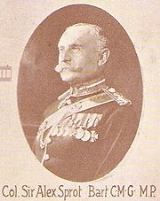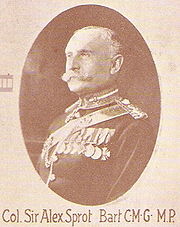
Sir Alexander Sprot, 1st Baronet
Encyclopedia
Colonel Sir Alexander Sprot, 1st Baronet CMG
DL
(24 April 1853 – 8 February 1929) was a British soldier and politician.
 The only son of Alexander Sprot of Garnkirk and Rachael Jane Cleghorn, he was educated at Harrow School
The only son of Alexander Sprot of Garnkirk and Rachael Jane Cleghorn, he was educated at Harrow School
and at Trinity College, Cambridge
.
. In 1874 he was commissioned Sub-Lieutenant
in the 6th Dragoon Guards. He was promoted Lieutenant in 1876, Captain
in 1882, Major
in 1889, Lieutenant-Colonel in 1900, and Colonel
in 1904. He served in the Second Anglo-Afghan War
1879-1880 (awarded the Afghanistan Medal
). He later served in the South African War (for which he was awarded the Queen's South Africa Medal
with 6 clasps, the King’s South Africa Medal with 2 clasps, and was mentioned in despatches twice). He retired in 1909, but later served in World War I
as an Administrative Commandant from 1915 (being mentioned in despatches twice and awarded the Mons Star, Croix de Guerre
, British War Medal
and Victory Medal
). He was appointed Companion of the Order of St Michael and St George
(CMG) in the 1917 New Year Honours.
Herbert Henry Asquith
. In 1918, Asquith was not opposed by a Coalition candidate, but the local Conservative Association decided put up a candidate against him. Sprot, despite being refused the "Coupon
" - the official endorsement given by David Lloyd George
and Andrew Bonar Law to Coalition candidates - defeated Asquith. Sprot sat for that constituency until he was defeated in 1922, and again in 1923. He then sat for North Lanarkshire
from 1924 until 1929.
He was created a Baronet
in 1918.
Order of St Michael and St George
The Most Distinguished Order of Saint Michael and Saint George is an order of chivalry founded on 28 April 1818 by George, Prince Regent, later George IV of the United Kingdom, while he was acting as Prince Regent for his father, George III....
DL
Deputy Lieutenant
In the United Kingdom, a Deputy Lieutenant is one of several deputies to the Lord Lieutenant of a lieutenancy area; an English ceremonial county, Welsh preserved county, Scottish lieutenancy area, or Northern Irish county borough or county....
(24 April 1853 – 8 February 1929) was a British soldier and politician.

Harrow School
Harrow School, commonly known simply as "Harrow", is an English independent school for boys situated in the town of Harrow, in north-west London.. The school is of worldwide renown. There is some evidence that there has been a school on the site since 1243 but the Harrow School we know today was...
and at Trinity College, Cambridge
Trinity College, Cambridge
Trinity College is a constituent college of the University of Cambridge. Trinity has more members than any other college in Cambridge or Oxford, with around 700 undergraduates, 430 graduates, and over 170 Fellows...
.
Military career
Sprot was commissioned into the Royal Lanarkshire Militia, where he reached the rank of LieutenantLieutenant
A lieutenant is a junior commissioned officer in many nations' armed forces. Typically, the rank of lieutenant in naval usage, while still a junior officer rank, is senior to the army rank...
. In 1874 he was commissioned Sub-Lieutenant
Sub-Lieutenant
Sub-lieutenant is a military rank. It is normally a junior officer rank.In many navies, a sub-lieutenant is a naval commissioned or subordinate officer, ranking below a lieutenant. In the Royal Navy the rank of sub-lieutenant is equivalent to the rank of lieutenant in the British Army and of...
in the 6th Dragoon Guards. He was promoted Lieutenant in 1876, Captain
Captain (British Army and Royal Marines)
Captain is a junior officer rank of the British Army and Royal Marines. It ranks above Lieutenant and below Major and has a NATO ranking code of OF-2. The rank is equivalent to a Lieutenant in the Royal Navy and to a Flight Lieutenant in the Royal Air Force...
in 1882, Major
Major
Major is a rank of commissioned officer, with corresponding ranks existing in almost every military in the world.When used unhyphenated, in conjunction with no other indicator of rank, the term refers to the rank just senior to that of an Army captain and just below the rank of lieutenant colonel. ...
in 1889, Lieutenant-Colonel in 1900, and Colonel
Colonel
Colonel , abbreviated Col or COL, is a military rank of a senior commissioned officer. It or a corresponding rank exists in most armies and in many air forces; the naval equivalent rank is generally "Captain". It is also used in some police forces and other paramilitary rank structures...
in 1904. He served in the Second Anglo-Afghan War
Second Anglo-Afghan War
The Second Anglo-Afghan War was fought between the United Kingdom and Afghanistan from 1878 to 1880, when the nation was ruled by Sher Ali Khan of the Barakzai dynasty, the son of former Emir Dost Mohammad Khan. This was the second time British India invaded Afghanistan. The war ended in a manner...
1879-1880 (awarded the Afghanistan Medal
Afghanistan Medal (United Kingdom)
The Afghanistan Medal was awarded for the military actions involving the British Army and local Indian units in Afghanistan between 1878–1880. This was the Second Anglo-Afghan War, the first being from 1839–1842....
). He later served in the South African War (for which he was awarded the Queen's South Africa Medal
Queen's South Africa Medal
The Queen's South Africa Medal was awarded to military personnel who served in the Boer War in South Africa between 11 October 1899 and 31 May 1902. Units from the British Army, Royal Navy, colonial forces who took part , civilians employed in official capacity and war correspondents...
with 6 clasps, the King’s South Africa Medal with 2 clasps, and was mentioned in despatches twice). He retired in 1909, but later served in World War I
World War I
World War I , which was predominantly called the World War or the Great War from its occurrence until 1939, and the First World War or World War I thereafter, was a major war centred in Europe that began on 28 July 1914 and lasted until 11 November 1918...
as an Administrative Commandant from 1915 (being mentioned in despatches twice and awarded the Mons Star, Croix de Guerre
Croix de guerre
The Croix de guerre is a military decoration of France. It was first created in 1915 and consists of a square-cross medal on two crossed swords, hanging from a ribbon with various degree pins. The decoration was awarded during World War I, again in World War II, and in other conflicts...
, British War Medal
British War Medal
The British War Medal was a campaign medal of the British Empire, for service in World War I.The medal was approved in 1919, for issue to officers and men of British and Imperial forces who had rendered service between 5 August 1914 and 11 November 1918...
and Victory Medal
Victory Medal (United Kingdom)
The Victory Medal is a campaign medal - of which the basic design and ribbon was adopted by Belgium, Brazil, Cuba, Czechoslovakia, France, Greece, Italy, Portugal, Romania, Siam, Union of South Africa and the USA in accordance with decisions as taken at the Inter-Allied Peace Conference at...
). He was appointed Companion of the Order of St Michael and St George
Order of St Michael and St George
The Most Distinguished Order of Saint Michael and Saint George is an order of chivalry founded on 28 April 1818 by George, Prince Regent, later George IV of the United Kingdom, while he was acting as Prince Regent for his father, George III....
(CMG) in the 1917 New Year Honours.
Political career
He unsuccessfully contested Montrose Burghs in 1906. In the two elections in 1910 he stood in East Fife against the Prime MinisterPrime Minister of the United Kingdom
The Prime Minister of the United Kingdom of Great Britain and Northern Ireland is the Head of Her Majesty's Government in the United Kingdom. The Prime Minister and Cabinet are collectively accountable for their policies and actions to the Sovereign, to Parliament, to their political party and...
Herbert Henry Asquith
H. H. Asquith
Herbert Henry Asquith, 1st Earl of Oxford and Asquith, KG, PC, KC served as the Liberal Prime Minister of the United Kingdom from 1908 to 1916...
. In 1918, Asquith was not opposed by a Coalition candidate, but the local Conservative Association decided put up a candidate against him. Sprot, despite being refused the "Coupon
Coalition Coupon
The ‘Coalition Coupon’, often referred to as ‘the coupon’, refers to the letter sent to parliamentary candidates at the United Kingdom general election, 1918 endorsing them as official representatives of the Coalition Government. The 1918 election took place in the heady atmosphere of victory in...
" - the official endorsement given by David Lloyd George
David Lloyd George
David Lloyd George, 1st Earl Lloyd-George of Dwyfor OM, PC was a British Liberal politician and statesman...
and Andrew Bonar Law to Coalition candidates - defeated Asquith. Sprot sat for that constituency until he was defeated in 1922, and again in 1923. He then sat for North Lanarkshire
North Lanarkshire (UK Parliament constituency)
North Lanarkshire was a county constituency of the House of Commons of the Parliament of the United Kingdom from 1868 to 1885 and from 1918 to 1983...
from 1924 until 1929.
Personal life
In 1879 he married Ethel Florence Thorp, daughter of Deputy Surgeon-General Edward C. Thorp, MD. He was also Master of the Fox Hounds with the Fife Hounds.He was created a Baronet
Baronet
A baronet or the rare female equivalent, a baronetess , is the holder of a hereditary baronetcy awarded by the British Crown...
in 1918.

